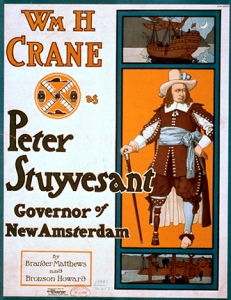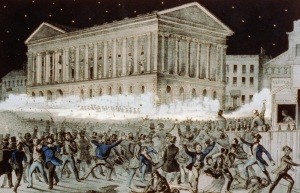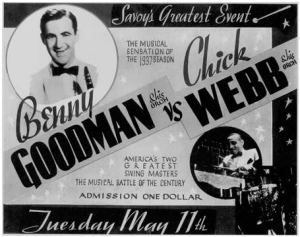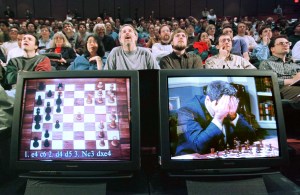New Yorkers, today is your day. Make something happen. For centuries, May 11 has been a bat-call for big moments in New York City history.
 In 1647, Peter Stuyvesant a/k/a Peg Leg Pete, arrived in New Amsterdam to take charge as the new governor of the wayward Dutch West India Company town. Garbage ran through the streets, booze flowed like water, and a recent war with Native American tribes had destroyed outposts and left the main settlement vulnerable. Stuyvesant’s authoritarianism didn’t make him very popular, but he ran a tight ship, and when the Dutch surrendered New Amsterdam without a fight in 1664, Stuyvesant handed over a more stable and developed village than the one he took over.
In 1647, Peter Stuyvesant a/k/a Peg Leg Pete, arrived in New Amsterdam to take charge as the new governor of the wayward Dutch West India Company town. Garbage ran through the streets, booze flowed like water, and a recent war with Native American tribes had destroyed outposts and left the main settlement vulnerable. Stuyvesant’s authoritarianism didn’t make him very popular, but he ran a tight ship, and when the Dutch surrendered New Amsterdam without a fight in 1664, Stuyvesant handed over a more stable and developed village than the one he took over.
A sorry but important chapter in New York City’s history were the thievery trials of 1741, for which the first hangings took place on May 11. In New York’s equivalent of the Salem Witch Trials, an arson that may or may not have been done by black and white abolitionists led to mass black executions and deportations, with the farcical “trials” (every lawyer in town was enlisted for the prosecution) only ending when prominent whites began turning on each other in the increasingly paranoid atmosphere.
I’m calling this next feature the Reznick Riot Alert, named for our site reader Jon Reznick, who froths in anticipation of the latest Today in Riot History. Jon, today is your lucky day, because few riots in the history of the city are more insane than the Astor Place Riot of 1849. A rivalry between Shakespearean actors, one British and one American, morphed into a proxy war that invoked class, national, and even international politics. The tumult across Manhattan left two dozen dead, many injured and arrested, and stores destroyed. Granted, the riot largely took place on the evening of May 10, but it carried on into the wee hours of the morning, and is certainly a kindred spirit with the rest of this May 11 activity. Podcast fans will really enjoy the Bowery Boys‘ episode telling the full story.
On May 11, 1877, a crowd gathered at the St. Denis Hotel, on Broadway and East 11th Street. There, Alexander Graham Bell publicly used a telephone line for the first time to make a phone call, chatting up an employee on the other end of the line in Brooklyn. Previously, Bell had relied on telegraph wires. Unrelatedly, did you know that Alexander Graham Bell invented the x-ray machine in a manic frenzy to find the bullet lodged inside assassinated President James Garfield?
It don’t mean a thing, if it ain’t got that swing. Even in the fading days of the Harlem Renaissance, the Savoy Ballroom was still hopping with the best swing bands of the era holding court in “Battle of the Bands” fashion. The home team was run by drummer Chick Webb, a short and wildly energetic bandleader. On May 11, 1937, bandleader and clarinetist Benny Goodman’s band, which included legendary drummer Gene Krupa, faced off against Webb in a highly anticipated showdown. As usual, Webb ended the night victorious. In fact, perhaps Chick Webb’s only Battle of the Bands loss came later that year, against Duke Ellington.
Margaret Sanger spent her entire career fighting for women to have access to birth control. Sanger founded many advocacy groups, including the precursor to Planned Parenthood, and suffered many arrests along the way. Her beliefs were grounded in both the health risks she had observed in populations of poor women forced to bring unwanted pregnancies to term and the philosophy that sex should be enjoyed outside the confines of procreation. (Like many of her contemporaries, her views on race and eugenics were less enlightened.) Late in life, she secured funding from spice heiress Katherine Dexter McCormick to develop a prototype for the first birth control pill. The pill was finally approved by the FDA on May 11, 1960.
New York race relations in the late 1980s and early 1990s were not good, and the election of David Dinkins as mayor had not reduced tensions. With the trial of Yusef Hawkins’ attackers and the Korean grocery boycott looming explosively over the city, on May 11, 1990, Dinkins gave a 25-minute speech on race relations in the City Council chambers.
“The city is sick of violence. We’re aching, and we must heal the pain. My administration will never lead by dividing. At the same time, and in the same spirit, we will never allow any group or any person to turn to violence or the threat of violence to intimidate others, no matter how legitimate their anger and frustration may be.”
The speech called for an end to the black boycott against Korean grocers and called for a plethora of measures to fight poverty in New York’s most distressed communities. Unfortunately, the boycott continued, and racial strife continued to define Dinkins’ term as mayor.
In the eternal battle between man and machine, machine claimed one for the ages when IBM’s Deep Blue defeated World Chess Champion Garry Kasparov on May 11, 1997, right here in NYC. During their previous showdown in 1996, Deep Blue had shocked the world by taking the first game of the match, but Kasparov won handily overall. For the highly anticipated re-match, the script was flipped, with Kasparov taking the first game, but Deep Blue drawing or winning the remainder, including the decisive sixth game. Chess has had many grandmasters come and go since, but computers are here to stay, even taking out Jeopardy! champions.
There has been as much action on May 11 recently. In 2003, which feels like a long time ago, the Times issued an exhaustive apology for being fooled by Jayson Blair, their star fabricating reporter. Exactly 30 years earlier, the Times had a much better day when their source for the Pentagon Papers, Daniel Ellsberg, was acquitted at trial.
In 2010, the City Council held a hearing on Paid Sick Leave, and the initial response was supportive. The program, passed in 2013 and championed by the de Blasio administration, could be one of the mayor’s most important legacies, as other cities and states consider following suit.
Still, like the earthquake for which New York is long overdue, something seismic may happen today. Or perhaps May 11 should just be a day to reflect on the past, for those moments where it has brought out the worst and the best in New Yorkers. Any way you choose to make it happen, happy May 11.




LikeLike
@ 1:10 mark
LikeLike
Awesome, love it!
LikeLike